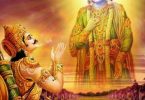Q. 1. There are still people (at least in India) who believe God is impersonal and say that devotion is just a stepping stone for realizing the Supreme Truth which they say is actually impersonal.
I am really eager to know what the Absolute Truth is. And I don’t like this confusion about the Absolute Truth. I am aware of all counter arguments that the Vaishnavas (that is us) give to defeat impersonalists. But then, I am told (by Vaishnavas) that the impersonalists will also have strong arguments for defeating personalism. So, how will I know what the Absolute Truth is? Is it Krishna (and I dearly want it to be so) or is it the impersonal Brahman?
I really want to be absolutely fixed in my devotion to Krishna, but this impersonal philosophy poses an obstacle in my progress.
Answer by Romapada Swami: An axiomatic principle in understanding the Absolute Truth is that it is NOT possible to be ascertained through arguments, counter-arguments and debates! Then how are we to know? By following the mahajanas. This is the advice from Mahabharata (Vana Parva 313.117):
tarko apratisthah shrutayo vibhinna
nasav rishir yasya matam na bhinnam
dharmasya tattvam nihitam guhayam
mahajano yena gatah sa panthah
“Dry arguments are inconclusive. One is not considered a great muni unless he puts forward a new opinion different from others. Simply by studying the Vedas, which are variegated, one cannot come to the right path by which religious principles are understood. The solid truth of religious principles is hidden in the heart of an unadulterated self-realized person. Consequently, one should follow the path advocated by the mahajanas.”
Who these mahajanas are is also spelled out in the Bhagavatam (6.3.20-21) – There are 12 mahajanas or authorities on the subject of Absolute Truth: Lord Brahma, Narada, Lord Shiva, the four Kumaras, Lord Kapila, Svayambhuva Manu, Prahlada Maharaja, Janaka, Grandfather Bhishma, Bali Maharaja, Sukadeva Gosvami and Yamaraja.
Thus if one wants to know the Absolute Truth conclusively, without doubts, one has to follow these great mahajanas, and those strictly following in their footsteps. By treading the path chalked out by such great souls as Narada, Prahlada, Hanuman, Bhishma, Arjuna, Sukadeva Goswami and so on up to the great saintly acharyas of recent times such as Ramanujacarya, Madhvacarya or Lord Caitanya and even the final teachings of Sankaracharya — we can rest assured that we are on the right track, regardless of the opinion of others. None of these great authorities have hinted in their teachings that devotional service to Vishnu is simply a means to realize some higher truth! Quite to the contrary, both by their precepts and personal attainment they have demonstrated devotional service as our eternal occupation, as both the means AND the ultimate goal of life that can be achieved.
Even if we were to simply accept the words of the Supreme Lord Krishna, whose authority is indisputable, then Krishna amply assures us, numerous times in the Bhagavad-Gita, that His personal form is the highest. In fact this very question you are posing was asked by Arjuna directly to Krishna so that the Lord can give His conclusive opinion leaving no room for ambiguity. (See BG 12.1)Krishna promptly replies that those who steadily worship Him are the most perfect; although the path of impersonal meditation may possibly bring one to the same goal of surrendering to Krishna, it is simply troublesome. (BG 12.1-8) He assures that there is no truth superior to Him (7.7), that His abode and the process of devotional service to Him are eternal (15.6. 9.2) and those who think that He was impersonal before and has assumed a human-like form later – He declares them to be less intelligent! (7.24) And His final instruction is that we give up all other considerations and surrender to Him alone & become His devotee (BG 18.65, 66). Is it reasonable to suppose that the Lord would make so many assertions to mislead us away from Reality? One who simply accepts Krishna’s direct statements with implicit faith will never be let down and is sure to achieve the highest destination of His Eternal Abode.
By great good fortune you have had the opportunity to hear Krishna’s message through His unadulterated devotees and you also have natural devotion for Him, so take shelter in Krishna’s words whenever false arguments sway your mind. Regularly meditate on the purport of His statements quoted above and try to enter into the spirit of this transcendental knowledge Krishna has mercifully given to slash all our misconceptions, and reassure us of His true nature. Simply on the basis of our faith in Krishna, we can proceed confidently on the path of pure devotion, free from doubt, as so many great souls have done in the past.
Q. 2. Is it possible to defeat impersonalism once and for all? I am told (by Vaishnavas) that the impersonalists will also have strong arguments for defeating personalism. So, how will I know what the Absolute Truth is?
Answer by Romapada Swami: Actually one who is a true knower of Truth understands that both the impersonal and personal are features of the same, non-dual Absolute. This is stated in Srimad Bhagavatam (SB 1.2.11). And Krishna states that He is the basis of the impersonal Brahman. (BG 14.27) Thus there is no real conflict between those searching after Brahman realization and those seeking to worship Bhagavan.
A beginning transcendentalist who is not yet acquainted with the all-attractive Supreme Personality, Bhagavan, may think of the Absolute as non-differentiated Brahman, but when they come in contact with Krishna’s transcendental nature through association with His message or His devotees, being already purified of material attachments, they immediately become attracted to the transcendental glories of Krsna. This is demonstrated in the lives of the four Kumaras and Sukadeva Goswami, who were all initially Brahman-realized and later became devotees of the Lord. In this instance, we see that quite contrary to devotional service being a stepping ladder to Brahman-realization, it actually happens to be the other way around! So, how fortunate are those who are right from the beginning trained to become attached to His personal feature!
A sincere student on the path of Brahman-realization (a brahma-vadi), however, does NOT minimize the position of devotional service nor do they deprecate the transcendental form, qualities and pastimes of Krishna or consider them to be a temporary, material manifestation – they have simply not realized this feature of the Absolute, just as a person seeing a hill from great distance thinks of it as a massive big cloud but is not aware of the variegated objects present on the hill. On the other hand those who relegate the transcendental attributes of Krishna and His devotional service to be a material, time-bound phenomenon – they are known as the mayavadis and are not in truth seekers of Absolute Truth but in fact offenders at the lotus feet of Krishna. Their opinion of devotional service is not substantiated by any authority.
Apart from considering the authority of scriptures and mahatmas, a compelling reason to reject the impersonal philosophy is that it is not practicable. Aside from the high sounding philosophical wrangling, it is not something that one can conduct his day-to-day life by. It is fraught with internal inconsistencies and cannot really address fundamental concerns such as why are we suffering and what is the remedy to end our suffering. “If we are all particles of Brahman why is it that Brahman is overcome by illusion now? And if it is simply a lila/pastime (as the impersonalists often tend to rationalize) then what is the meaning of ‘striving’ to attain liberation? And meanwhile what is the point in pursuing one’s present course of life in this world if it is ultimately just illusion?” – these crucial questions can never be satisfactorily answered by the mayavadis. Their practical life hardly ever reflects their theories. Whereas the life of pure devotees of Krishna is fully consistent with the philosophy they teach.
The Vaishnava theology explains that this material world is created to accommodate those living entities who want to be forgetful of God. By the process of engaging everything we have in this world in the course of our daily lives, once again in service to God, we can purify our existence and return back to Him again. And for those who are strongly averse to the personal feature of Krishna, He allows them to remain forgetful of His nature, and facility is provided for their gradual purification by focusing on the impersonal conception of God or the universal form of God. Considering this, in all likelihood there will always be a section of people in the material world who subscribe to an impersonal understanding, with reasons to justify their position – the Lord Himself has purposefully allowed for this to happen. The fact that there are some people who follow such an indirect path does not preclude a sincere seeker of Truth from accepting the true conception of Reality when it is presented to them.
Your understanding that the impersonalists also may have sound, consistent, justifiable arguments to defeat personalism is not a fact. Arguments there may be – in a court of law, two advocates may put forth strong arguments to defend their respective stand, but ultimately it is for the judge to hear both sides and decide what the real situation is. Similarly, in spite of all the arguments presented by both parties, we rely on the final judgment of the mahajanas and the great authorities in their line such as Lord Caitanya, Ramanujacarya or Madhvacarya to conclusively know the Truth.
Q. 3. These discussions about the impersonal feature and the arguments and the efforts to defeat the philosophy mean that we are also taking the impersonal philosophy seriously enough to try to defeat it.
Answer by Romapada Swami: Yes, Srila Prabhupada and all these other previous acharyas seriously opposed and defeated the impersonal Mayavada misconception – not due to viewing contradictory opinions as a threat to their own convictions, like mundane sectarians defend their theories. A Vaishnava is by nature meek and humble, not interested in arguments and asserting over others. Rather, it is compassion that moves them to speak forcefully against mayavada – because, in Srila Prabhupada’s words, it is the last snare of maya.
Our real disease is that conditioned souls want to enjoy independent of God; when one is frustrated in one’s attempts for material enjoyment, one turns to inquiring into the Absolute, but because of this deep- rooted spirit of independent-mindedness one becomes attracted to impersonal speculations by which one can philosophically put God out of existence and conveniently continue the illusion of being independent of the Lord. Obviously, if ultimately there is only non-differentiated Brahman, there is no need for my surrender or submission to anyone, you see! Therefore, not only the acharyas but even Lord Krishna Himself soundly defeats this dangerous misconception throughout the Bhagavad- Gita, for the benefit of conditioned souls, so that we may not be misled.







